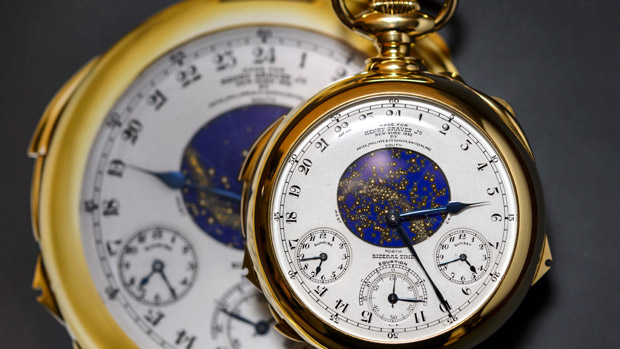World's most complicated watch sells for a record £13.4m
The Henry Graves Supercomplication was made for a New York City banker in the 1930s

A free daily email with the biggest news stories of the day – and the best features from TheWeek.com
You are now subscribed
Your newsletter sign-up was successful
A watch believed to be the most complex ever built without the help of computers sold at auction yesterday for a new world record: £13.4m. The Henry Graves Supercomplication was made by Patek Philippe in the 1930s.
The gold pocket watch is known as the pinnacle of the watchmakers art because of its 24 'complications', says the BBC. A complication is a watchmaker's term for any extra feature which does more than simply tell the time.
Wealthy banker Henry Graves wanted a watch with more complications than anyone else - in particular his rival, automotive pioneer James Packard, who had recently commissioned a watch for himself with 10 complications, including a star map.
The Week
Escape your echo chamber. Get the facts behind the news, plus analysis from multiple perspectives.

Sign up for The Week's Free Newsletters
From our morning news briefing to a weekly Good News Newsletter, get the best of The Week delivered directly to your inbox.
From our morning news briefing to a weekly Good News Newsletter, get the best of The Week delivered directly to your inbox.
Graves, who had been born into a dynasty of rich financiers, commissioned Swiss firm Patek Philippe to make him something even better. After three years of research and five of manufacturing, the watch was finished in 1932.
With 900 parts, the Henry Graves Supercomplication remained the most sophisticated watch ever built for 56 years. It was only beaten by watchmakers working with the help of computers.
Although the watch has not been wound up since 1969, it is still in working order. Among its features is a rotating map of the stars as they appear from Graves's apartment on Fifth Avenue in New York.
The watch also indicates sidereal time, which is used by astronomers to keep track of the stars and planets. A sidereal day is approximately 23 hours, 56 minutes and 4.1 seconds long.
A free daily email with the biggest news stories of the day – and the best features from TheWeek.com
Other complications include Westminster chimes, a perpetual calendar, sunrise and sunset times, ages and phases of the moon, a split-second stopwatch, an alarm, a minute-repeater and twin barrel differential winding.
The watch smashed its estimate of £10.5m and sold in just 15 minutes to an anonymous bidder at Southeby's in Geneva.
-
 Political cartoons for February 22
Political cartoons for February 22Cartoons Sunday’s political cartoons include Black history month, bloodsuckers, and more
-
 The mystery of flight MH370
The mystery of flight MH370The Explainer In 2014, the passenger plane vanished without trace. Twelve years on, a new operation is under way to find the wreckage of the doomed airliner
-
 5 royally funny cartoons about the former prince Andrew’s arrest
5 royally funny cartoons about the former prince Andrew’s arrestCartoons Artists take on falling from grace, kingly manners, and more
-
 Epstein files topple law CEO, roil UK government
Epstein files topple law CEO, roil UK governmentSpeed Read Peter Mandelson, Britain’s former ambassador to the US, is caught up in the scandal
-
 Iran and US prepare to meet after skirmishes
Iran and US prepare to meet after skirmishesSpeed Read The incident comes amid heightened tensions in the Middle East
-
 Israel retrieves final hostage’s body from Gaza
Israel retrieves final hostage’s body from GazaSpeed Read The 24-year-old police officer was killed during the initial Hamas attack
-
 China’s Xi targets top general in growing purge
China’s Xi targets top general in growing purgeSpeed Read Zhang Youxia is being investigated over ‘grave violations’ of the law
-
 Panama and Canada are negotiating over a crucial copper mine
Panama and Canada are negotiating over a crucial copper mineIn the Spotlight Panama is set to make a final decision on the mine this summer
-
 Why Greenland’s natural resources are nearly impossible to mine
Why Greenland’s natural resources are nearly impossible to mineThe Explainer The country’s natural landscape makes the task extremely difficult
-
 Iran cuts internet as protests escalate
Iran cuts internet as protests escalateSpeed Reada Government buildings across the country have been set on fire
-
 US nabs ‘shadow’ tanker claimed by Russia
US nabs ‘shadow’ tanker claimed by RussiaSpeed Read The ship was one of two vessels seized by the US military